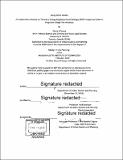| dc.contributor.advisor | Karl Seidman. | en_US |
| dc.contributor.author | D'Souza, Pierre(Pierre Antoine) | en_US |
| dc.contributor.other | Massachusetts Institute of Technology. Department of Urban Studies and Planning. | en_US |
| dc.coverage.spatial | n-cn-on | en_US |
| dc.date.accessioned | 2019-07-17T21:00:16Z | |
| dc.date.available | 2019-07-17T21:00:16Z | |
| dc.date.copyright | 2019 | en_US |
| dc.date.issued | 2019 | en_US |
| dc.identifier.uri | https://hdl.handle.net/1721.1/121746 | |
| dc.description | Thesis: M.C.P., Massachusetts Institute of Technology, Department of Urban Studies and Planning, 2019 | en_US |
| dc.description | Cataloged from PDF version of thesis. | en_US |
| dc.description | Includes bibliographical references (pages 86-96). | en_US |
| dc.description.abstract | The Strong Neighbourhood Strategy 2020 (TSNS 2020) is an initiative started by the City of Toronto in 2014. The strategy's intention was to engage neighbourhood residents, city services, and local non-profits in community and economic development to generate tailored solutions that would result in heightened are prosperity, vibrancy, and safety in 31 of the city's most vulnerable neighbourhoods. My exploratory analysis focused on how the strategy attempted to address violent crime prevention and mitigation in one of these neighbourhoods (Kingsview Village-The Westway). Employing a combination of comparative violent crime data analysis, stakeholder interviews, and literature reviews from academic sources as well as my background in law enforcement, I could not find any evidence that TSNS 2020 had led to reductions in violent crime in Kingsview Village-The Westway. Furthermore, I elaborated on a series of fundamental strategic and implementational flaws in TSNS 2020 has halted its ability to achieve positive results and suggested methods TSNS 2020 could use to enhance their success rate as they look to learn from their past mistakes and build for the strategy's future. It is important to note that my exploratory analysis was conducted with a very small sample size and dataset and therefore should be taken a launching point for a more robust future evaluations of TSNS 2020 successes and shortcomings in the field of crime prevention and mitigation. | en_US |
| dc.description.statementofresponsibility | by Pierre D'Souza. | en_US |
| dc.format.extent | 96 pages | en_US |
| dc.language.iso | eng | en_US |
| dc.publisher | Massachusetts Institute of Technology | en_US |
| dc.rights | MIT theses are protected by copyright. They may be viewed, downloaded, or printed from this source but further reproduction or distribution in any format is prohibited without written permission. | en_US |
| dc.rights.uri | http://dspace.mit.edu/handle/1721.1/7582 | en_US |
| dc.subject | Urban Studies and Planning. | en_US |
| dc.title | Doing what works : an exploratory analysis on Toronto's Strong Neighbourhood Strategy 2020's impact on crime in Kingsview Village-The Westway | en_US |
| dc.title.alternative | Exploratory analysis on Toronto's Strong Neighbourhood Strategy 2020's impact on crime in Kingsview Village-The Westway | en_US |
| dc.type | Thesis | en_US |
| dc.description.degree | M.C.P. | en_US |
| dc.contributor.department | Massachusetts Institute of Technology. Department of Urban Studies and Planning | en_US |
| dc.identifier.oclc | 1102052324 | en_US |
| dc.description.collection | M.C.P. Massachusetts Institute of Technology, Department of Urban Studies and Planning | en_US |
| dspace.imported | 2019-07-17T21:00:16Z | en_US |
| mit.thesis.degree | Master | en_US |
| mit.thesis.department | UrbStud | en_US |
